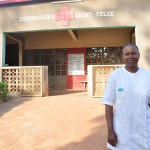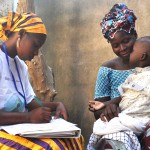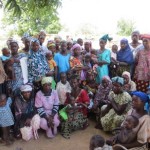
April 2014—Veronique Diawara, 26, lives in the small town of Kita, just three hours away from the capital city of Bamako in Mali. An obstetric nurse, she has been working at her local community health center for three years.

Fatimata Touré’s hard work might be unkown to many, but it has not gone unnoticed. She was recently recognized at the 2014 International Women of Courage Award Ceremony for her exceptional efforts to promote women's health rights and fight against acts of gender-based violence. She was one of 10 women to receive the award from the U.S.

Approximately one in 10 children in Mali die before reaching their 5th birthday, and malaria is the number one cause of death.

Katouma, 48 months, is amongst the cleanest, happiest and most active children of the many gathered with their mothers in Tion, the Ségou region of Mali. The mothers discuss a newly introduced approach to nutrition and the benefits it has brought to their households.
Each year, thousands of women die during pregnancy and childbirth in Mali. Among those who do not die, an unknown number suffer from obstetric fistula, a maternal injury with perhaps the most devastating aftermath. Obstetric fistula can lead to chronic incontinence and severe nerve damage, which can affect a woman’s ability to walk. In addition to the physical damage, women also endure a heavy psycological toll. In up to 90 percent of cases, the baby is stillborn or dies within weeks. And women suffering from this condition are often ostracized by their communities, religious houses of prayer and even their families.








Comment
Make a general inquiry or suggest an improvement.